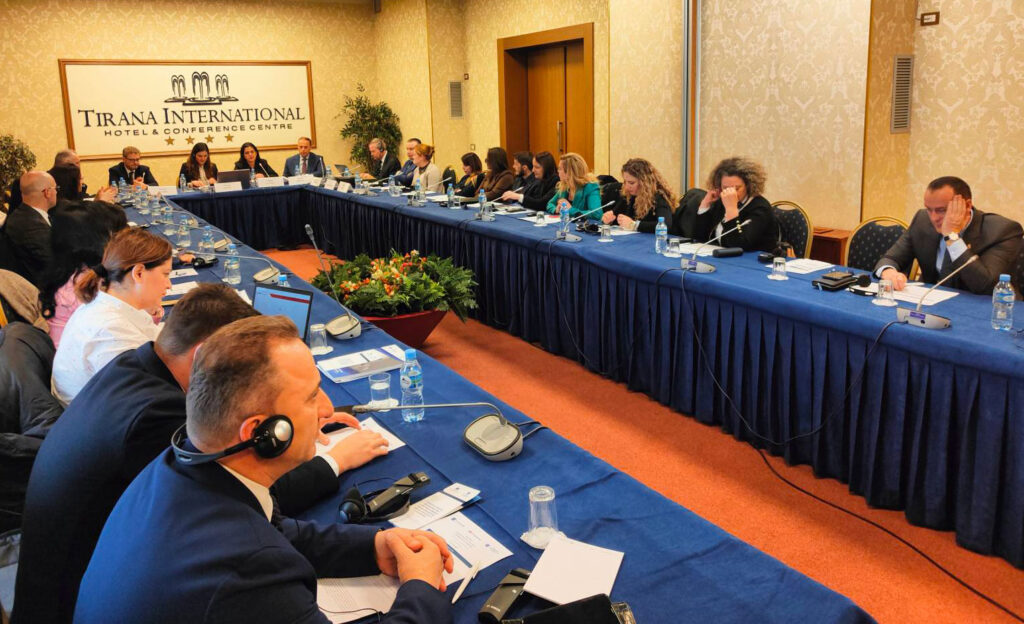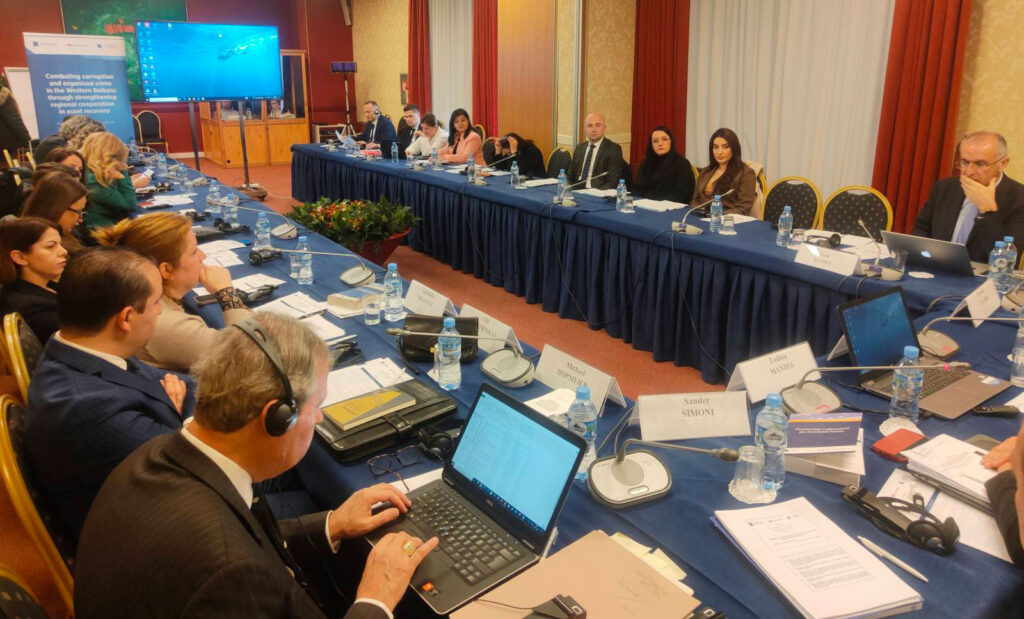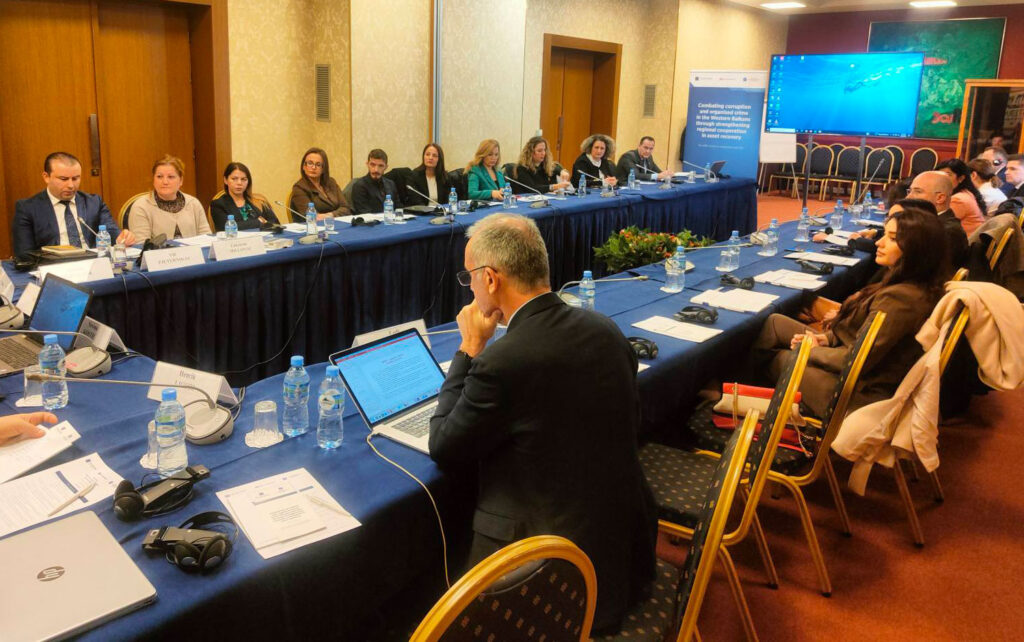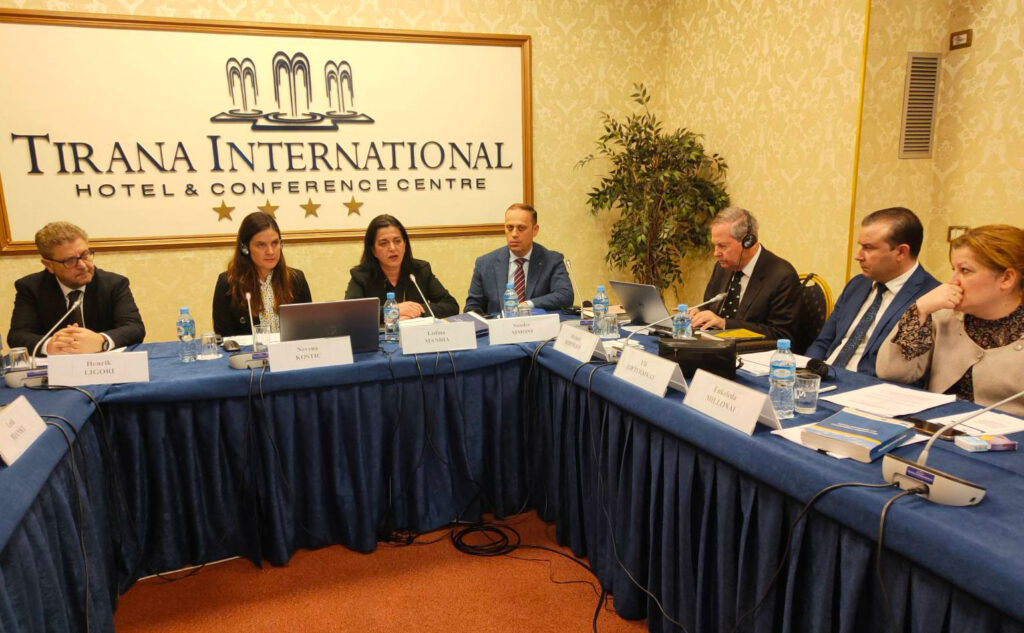
Tirana, 02.03.2023. – On 27th and 28th of February, the AIRE Centre and the Regional Anti-Corruption Initiative, in cooperation with the Albanian School of Magistrates, held a training in Tirana for judges and prosecutors in Albania about asset recovery, the process of depriving criminals of their illegally obtained wealth. Participants had an opportunity to learn more about legislative framework and practice in Albania, the human rights standards and asset recovery measures from the European Court of Human Rights and challenges in confiscation and asset recovery cases, from both national and international experts.
Education was led by His Honour Judge Michael Hopmeier, who sits as a judge at Southwark Crown Court in London and is a Deemster on the Isle of Man. Judge Hopmeier spoke to the Albanian judges and prosecutors about the importance of confiscation of the Proceeds of Crime in the context of the fight against organised crime and confiscation. He compared the Albanian legislation with UK and EU legislation and whilst he pointed out the differences in terms of the precise laws and procedures, the aims are the same, namely to deprive criminals of their benefit from criminal activities whether following conviction in a criminal court or by the use of non-conviction based asset recovery. Judge Hopmeier referred also to the many challenges in this area, including the use by criminals of virtual currencies and the difficulties, where criminals are hiding their assets by the use of off-shore companies, in identifying the ultimate beneficial owners of such companies used to launder the proceeds of crime. Furthermore, he also referred to the latest developments in the UK and the EU requiring overseas companies who own property in the UK and EU (as well as developments in the USA and elsewhere) to register the ultimate beneficial owners of companies.

Apart from Judge Hompeier, lectures were also given by Ledina Mandia, advocate and lecturer from Tirana, Sander Simoni, judge of the Supreme Court of Albania, Ledi Bianku, former judge at the European Court of Human Rights and an associate professor at the University of Strasbourg, Enkeleda Millonai, prosecutor at Special Prosecutor’s Office and Ylli Pjeternikaj, prosecutor at Prosecutor’s Office of the Judicial District of Lezhe.
“The implementation of the legal framework enshrined in the international instruments, as well as the implementation of the national legislation in force in the Republic of Albania, is decisive in the fight against corruption and organised crime through seizure and confiscation of assets of crime”, said Ledina Mandia, advocate and lecturer from Tirana.
“Prosecutors and judges in the jurisdiction of the Special Prosecution Office and of the Special Court, as well of other Prosecution Offices and Courts were very active in an interactive workshop sharing practices related to the implementation of the legal framework in force and issues in the implementation of the law, with the aim of, on the one hand, ensuring effectiveness in the implementation of both the criminal and preventive laws in Albania in the interest of protecting the legal order and public interest, and, on the other hand, guaranteeing the right of parties in court proceedings in line with the provisions of the national law and binding international law in Albania, including the ECHR and its jurisprudence”, she explained.
“According to the Albanian law, preventive confiscation of assets is an efficient instrument in the hands of Albanian prosecutors to apply the principle that crime does not pay and that the proceeds of criminal assets are transferred to the public interest, thus fighting crime in its weakest spot. However, judges must be careful in guaranteeing the lawful assets of citizens, ensuring their economic freedom, providing opportunities for demonstration of the burden of proof for their legal assets and protecting the interests of third parties, in accordance with the international standards. This was one of the issues that were discussed and addressed with judges and prosecutors, members of the AIRE network, during the workshop organised on 27 – 28 February 2023”, said Sandër Simoni, judge of the Supreme Court of Albania.
“The subject we discussed today is a delicate one, because it pursues two legitimate goals: first, the repression of persons involved in organised crime and corruption, confiscating the profits secured through crime; secondly, the preventive effect, since the weakening of their economic power makes them more vulnerable and less influential in terms of influencing law enforcement forces and the possibility of influencing decision-making with criminal intent”, said Henrik Ligori, lecturer at the School of Magistrates in Albania.

Albania has taken crucial steps in ensuring effective asset recovery, which is regulated by the special Anti-Mafia Law as well as the Criminal Code and the Criminal Procedure Code, which deal with ordinary confiscation, covering offences with strong links between criminal offences and the proceeds of crime. Enhanced confiscation, a key measure in the fight against organised crime and corruption, is regulated by the Anti-Mafia Law.
However, much work still remains to be done. Despite asset recovery being firmly on the policy agenda, the 2019 report of Transparency International found that seizures and confiscations of criminal assets in cases relating to corruption are not systematically ordered or carried out in Albania. Furthermore, the European Commission’s Report on Albania for 2019 outlines that Albania should make further progress towards establishing a solid history of seizures and confiscations of criminal assets derived from criminal activities related to corruption and organised crime, further increase the use of financial investigations, complete procedures for the establishment of specialised anti-corruption bodies to address high-level corruption cases and provide resources and ensure cooperation between these new structures, as well as continue to improve access to national electronic records for law enforcement authorities.
“For almost 30 years, the AIRE Centre activities in the Balkans, and especially in Albania, have been focused on some of the most important and trickiest legal issues for the national institutions and lawyers, in supporting their efforts to apply and respect international standards in many areas. This is, indeed, the case with the asset recovery project that the AIRE Centre is currently leading. The fight against organised crime and corruption being of the highest concern for the entire Western Balkans region, the recovery of criminal assets has proven as an important tool to effectively fight these criminal activities. By bringing together national actors with national and international experts, AIRE Centre plays an important role in facilitating the understanding, the application and the success of the fight against those criminal activities, while in the same time respecting fundamental rights of those affected”, said Ledi Bianku, former judge at the European Court of Human Rights and an associate professor at the University of Strasbourg.
Therefore, it is crucial that the work and cooperation of the institutions in Albania is improved when it comes to every step of this process, to have final decisions that actually end with permanent and final confiscation of the property, which can subsequently ensure the effective fight against corruption and organised crime.
The education “Effective asset recovery: Judicial perspective” was held as part of the project “Combating corruption and organised crime in the Western Balkans through strengthening regional cooperation in asset recovery”, implemented by the AIRE Centre and Regional Anti-Corruption Initiative – RAI and supported by the UK Government. Find out more at Asset Recovery Platform.


